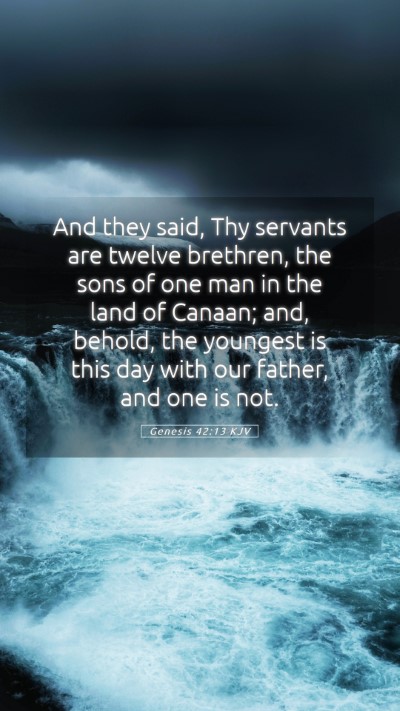Bible Verse Meaning and Commentary on Genesis 42:13
Genesis 42:13 (KJV): "And they said, Thy servants are twelve brethren, the sons of one man in the land of Canaan; and behold, the youngest is this day with our father, and one is not." This verse is a pivotal moment in the narrative of Joseph and his brothers. It reveals the dynamics of family, loyalty, and the unfolding plan of God throughout the story.
Analysis and Interpretation
The verse captures the brothers’ response to Joseph (who they do not recognize) while they are in Egypt seeking grain during a famine. When they say they are twelve brothers, they emphasize their family unity and the loss they have faced, as one brother is proclaimed “not” anymore, referring to Joseph himself.
Historical Context
This confession serves to highlight the brothers' awareness of their fractured family due to their past betrayal of Joseph. It also sets the stage for the complex interactions that follow, revealing themes of reconciliation and divine providence.
Commentary Insights
- Matthew Henry: Henry emphasizes the sorrow and regret that permeate the brothers' speech, indicating their recognition of past sins. He suggests that their acknowledgment of their youngest brother places them in a mindset of humility and guilt.
- Albert Barnes: Barnes draws attention to the number of brothers and the significance of family ties. He notes that the brothers’ statement implies a bond that transcends their current predicament and reflects on their father's grief over losing Joseph, which weighs heavily on their conscience.
- Adam Clarke: Clarke interprets the verse as revealing both the literal familial structure and the broader implications of their faith and identity as God’s chosen people. He gives this context the theological importance that even in their treachery, God's purposes will prevail.
Key Themes
- Remorse and Regret: The brothers' admission of their family ties serves as a stark reminder of their failure to protect Joseph. This introduces themes of repentance that resonate throughout the narrative.
- God’s Providence: Even in the brothers' betrayal, God's hand is evident, guiding events towards redemption and the preservation of the chosen lineage.
- Family Dynamics: The intricacies of brotherly relationships are underscored through their dialogue, pointing to the significant emotional and spiritual bonds that influence their actions.
Applications for Today
Understanding Genesis 42:13 provides important insights into navigating family relationships and the path to forgiveness. Believers today can reflect on their own familial ties and consider how they handle grievances and conflicts, seeking reconciliation much like Joseph and his brothers.
Cross References
- Genesis 37:31-33: The brothers’ earlier deceit about Joseph’s fate.
- Genesis 39:1-6: Joseph's rise to power in Egypt after being sold into slavery.
- Genesis 45:4-8: Joseph's eventual revelation of himself to his brothers and their reconciliation.
Conclusion
In summary, the explanation and commentary of Genesis 42:13 reveal a deep understanding of familial relationships, the weight of guilt, and the overarching narrative of divine providence. For those engaged in Bible study groups or seeking online resources for deeper Bible study, reflecting on such passages is essential for grasping the full context and lessons within scripture.


